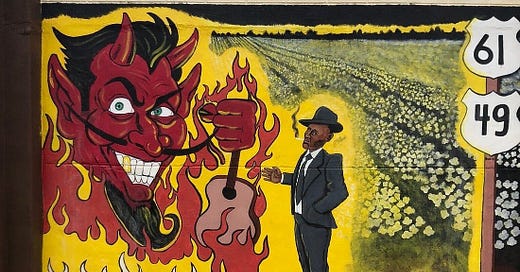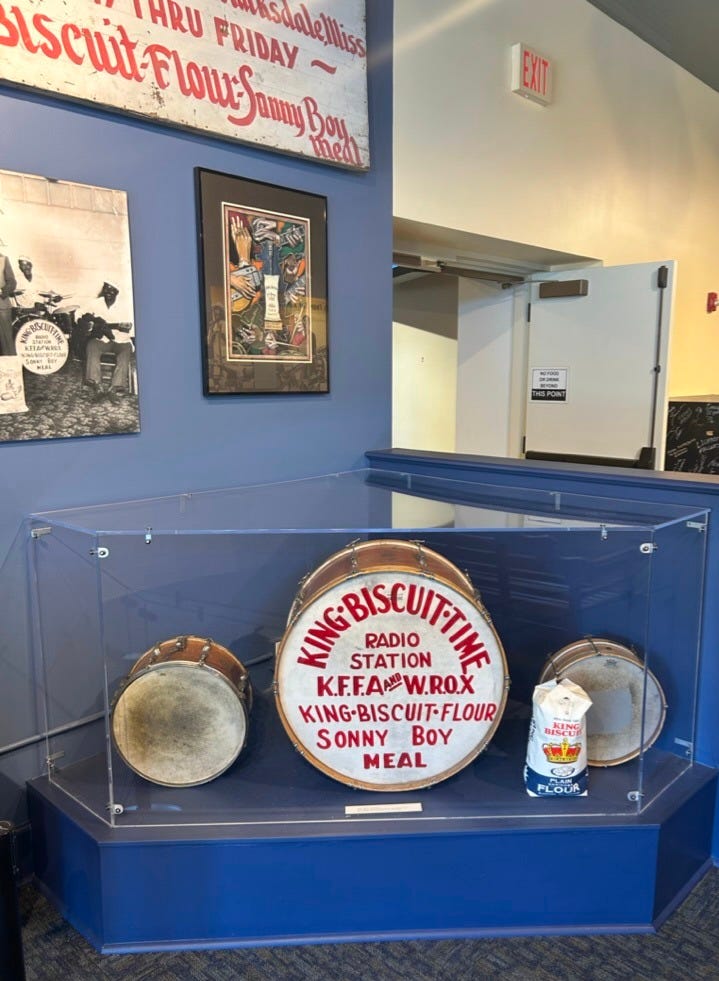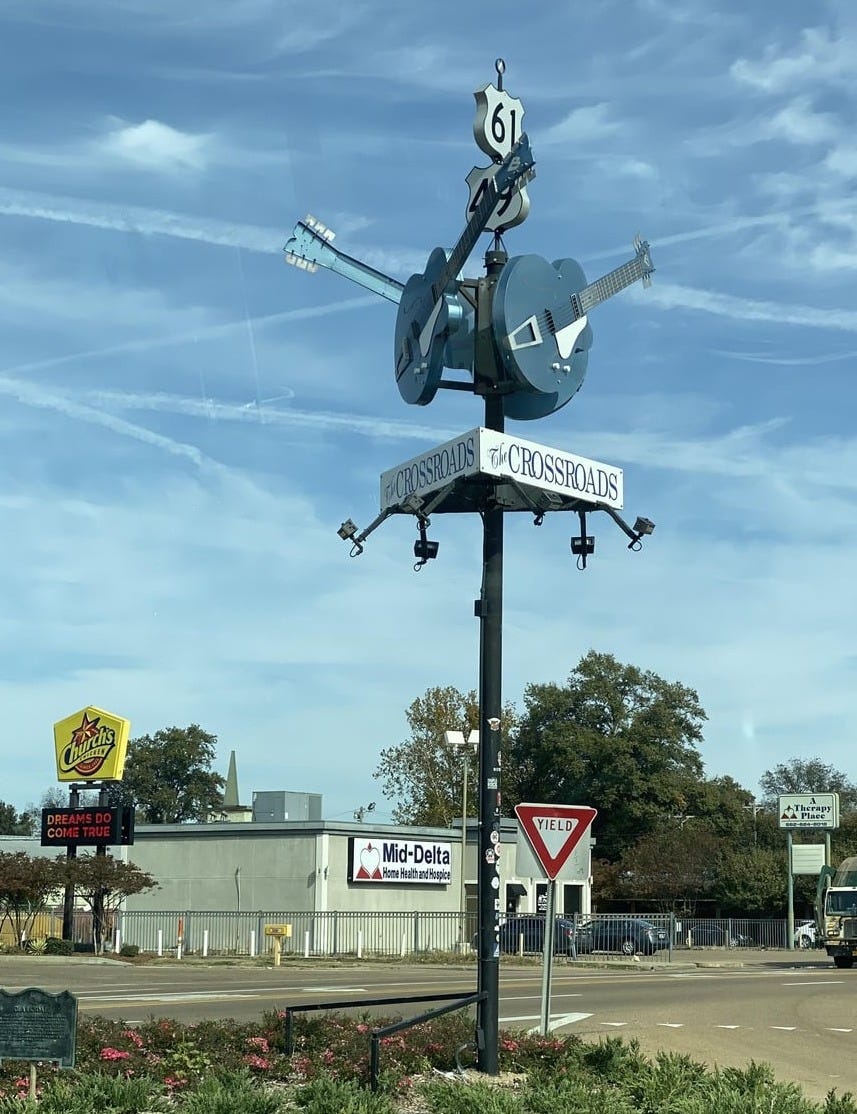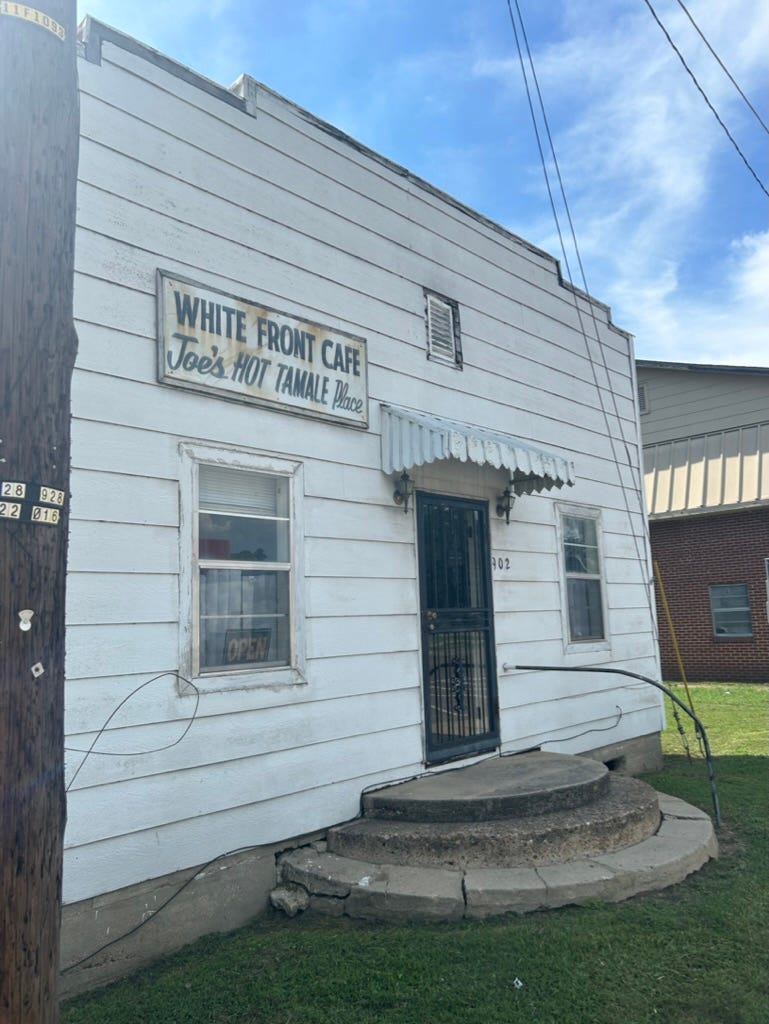The Mississippi Delta begins in the Lobby of the Peabody Hotel and ends at “Catfish Row” in Vicksburg.
-David L. Cohn 1935
Since last week, I covered 245 miles, from Memphis to Lake Providence, Louisiana. I wish I could have covered more, but with a persistent, tough south head wind and my own wanderings off the river, that’s all I got.
After leaving Memphis, I pulled into the Tunica River Park Launch to visit the Gateway to the Blues Museum:
It’s located on the legendary U.S. Highway 61, which runs on the east side of the river here.
Highway 61 stretches from Thunder Bay, Ontario, crosses the Canada–US border just north of Grand Portage, Minnesota, and runs along Lake Superior, then down south through small towns like Moose Lake, Bald Eagle, and my hometown of White Bear Lake before it hits St. Paul to follow the Mississippi River down to New Orleans.
The Museum was well worth the stop. They have a fine collection and provide a lot of history about the region’s impact on the development of blues music. For example, W.C. Handy’s cornet is just one of the many treasures you’ll find in the museum:
Tunica County has a rich musical heritage. Many of the most influential blues artists were born and raised in the Tunica region: Robert Johnson, Charley Patton, Son House, Sonny Boy Williamson, Muddy Waters, Howlin’ Wolf, and B.B. King.
After a long break off the river, I got back on at midafternoon.
My next stop was Helena, Arkansas, to visit the Delta Cultural Center, another worthwhile stop. The Delta Cultural Center is home to the influential blues radio show “King Biscuit Time.” The King Biscuit Time show was led by master of ceremonies “Sunshine” Sonny Payne, who had hosted the show on KFFA since the early 1950s and continued to broadcast until his death in February 2018 at the age of 92.
King Biscuit Time, originally sponsored by the King Biscuit Flour Co., is the longest-running daily blues radio show in the United States, first broadcast by KFFA Radio on November 21, 1941. Since then, the program has become world-renowned. In 1990, the program began broadcasting from the studio at Helena’s Delta Cultural Center.
The center has a lot of interesting memorabilia, like James "Peck" Curtis’ drums from the original King Biscuit Time band:
Levon Helm, the late drummer and vocalist for The Band, credited King Biscuit Time, and in particular, James "Peck" Curtis, for inspiring his musical career. According to Murray Rasberry “Munnie” Jordan, executive director of the King Biscuit Blues Festival, whom I met at their headquarters, Helm was born in nearby Turkey Scratch, Arkansas, and worked at her father’s Pure Oil station in Helena.
Back in the mid-1970s, when I was checking out blues albums from the library in White Bear Lake, Minnesota, I was also listening to a blues and pop show on public radio called King Biscuit Flower Hour. The show's name was derived from King Biscuit Time combined with the hippie phrase flower power.
Interestingly, years later, I’d run across an album of Sonny Boy Williamson’s King Biscuit Time songs at Down Home Music Shop, a great record store opened by Chris Strachwitz in 1976 in El Cerrito, just next to Berkeley, California.
In 1960, Strachwitz founded the one-man operation Arhoolie Records. Eventually produced more than four hundred albums during more than forty years in operation, exploring the far corners of American vernacular music - blues, gospel, Cajun, zydeco, hillbilly, Texas-Mexican norteno music, and more. I wrote about him here:
When I got out of the service in the late 1980s, I was living in Cupertino, California, in the South Bay Area. I went to Strachwitz’s Down Home Music Shop every once in a while, usually before I hit the horse races at Golden Gate Field in Berkeley.
One of the first records I bought from him was this one:
These are Sonny Boy Williamson's first records, originally recorded in 1951 for the Trumpet label. Although it was only in business from 1950 to 1955, the label was influential in recording early blues music. Here’s one of the original Trumpet 78 rpm records from that Arhoolie release, Stop Now Baby, recorded in Jackson, Mississippi, in 1951:
Trumpet Records was run by Lillian McMurry and her husband Willard, who set up the recording facility in her husband’s furniture and radio repair shop, the Record Mart, at 309 North Farish Street in Jackson, Mississippi. In 1950, they converted the back room into a recording studio. Strachwitz eventually purchased the tracks and in 1970 released them on his Arhoolie Records label. Incidentally, Sonny Boy's widow received royalties on all sales of this LP.
Helena, Arkansas, holds a significant place in blues history, particularly as a center for the Delta blues tradition. It was home to numerous blues musicians, including Sonny Boy Williamson and Robert Johnson, who played a key role in shaping the Delta blues style and genre.
From 1932 until he died in 1938, Robert Johnson moved frequently between Memphis and Helena, as well as smaller towns in the Mississippi Delta and neighboring regions of Mississippi and Arkansas, often making those trips on Highway 61.
Bob Dylan was born in Duluth, Minnesota, on Highway 61. Dylan may have made it famous with his album Highway 61 Revisited, but it was bluesmen like Robert Johnson who gave it the name “The Blues Highway.” In his memoir Chronicles: Volume One, Dylan wrote:
Highway 61, the main thoroughfare of the country blues, begins about where I began. I always felt like I'd started on it, always had been on it and could go anywhere, even down in to the deep Delta country. It was the same road, full of the same contradictions, the same one-horse towns, the same spiritual ancestors ... It was my place in the universe, always felt like it was in my blood.
As I left Helena and headed downriver toward Clarksdale, another legendary blues town, I was listening to this:
Someday I’ll get to Clarksdale, but it was a little too far off the river for me to visit on this journey.
Robert Johnson is thought to have sold his soul to the devil at the Highway 61 and Route 49 crossroads in Clarksdale, about 30 miles south of Helena. If you head east out of Helena on Highway 49 and turn right on Highway 61, you’ll hit the alleged crossroads Johnson sang about:
However, Rosedale, 40 miles south of Clarksdale, was immortalized in Johnson’s 1937 recording Traveling Riverside Blues. Although the song does not mention the town, it has since become associated with the legend and claims the real crossroad is at Highway 8 and Highway 1 in Rosedale. To further support that claim, in 1966, Eric Clapton and Cream incorporated “Going down to Rosedale” into their song Crossroads, their cover of Johnson’s Cross Road Blues. But it’s all just myth anyway.
Another myth, the claim that Robert Johnson went to the crossroads and sold his soul to the devil is also widely believed; however, in reality, if you listen to the song, he sings that he went to the crossroads, fell down on his knees, and begged the lord to have mercy and save him:
It’s difficult for me to imagine that he would sell his soul to the devil and ask God to save him at the same time. I guess selling your soul to the devil makes for a good theater.
From Helena, I continued downriver toward Rosedale. When I got there, I pulled into the landing and luckily found a ride to town from Porter, a local guy hanging out at the landing.
Interestingly, when I saw this place in town, it reminded me of Johnson’s 1937 recording They’re Red Hot:
In the song, Johnson sings:
Hot tamales and they're red hot, yes you got'em for sale, I mean
Yes, she got'em for sale Hot tamales and they're red hot,
yes she got'em for sale
I had to go in and get some hot tamales from Barbara, Joe’s sister. She did indeed have them for sale, and they were awesome.
After my quick stop in Rosedale, I moved on downriver toward Greenville and Lake Providence, Louisiana, the only two river towns between Helena and Vicksburg, Mississippi.
This stretch of the river is remote and wild. I camped on the river each night. Here’s one of my campsites - that’s my canoe on the bank at the far left and a gigantic tree that washed up on the shoreline at the right:
This week, with tough head winds and weather delays along the way, I was falling behind schedule. Vicksburg was still a long way downriver. It seemed appropriate to end the journey on the 4th of July. I was met at Lake Providence, Louisiana, by my brother and nephew from Houston. We packed up my rig and drove down to New Orleans.
It was an amazing journey. I feel blessed that I was able to get down as far as I did, safe and sound. So next week will be my last post on my Mississippi River journey, and I’ll offer some final thoughts…
Your true pilot cares nothing about anything on earth but the river, and his pride in his occupation surpasses the pride of kings.
-Mark Twain
Please hit this link to buy me a cup of coffee, if you’d like to show your guide some appreciation for this and past journeys. Know in advance that I thank you for your kindness and support.
If you like what you’ve been reading and hearing so far on our journey and would like to share this with someone you think might be interested in learning more about our great American art form, Jazz, just hit the “Share” button.
From Astaire to Sun Ra: A Jazz Journey is a reader-supported publication. If you feel so inclined, subscribe to my journey by hitting the “Subscribe now” button.
Also, find my playlist on Spotify: From Fred Astaire to Sun Ra.
Feel free to contact me at any time to talk shop. I welcome and encourage that.
Until then, keep on walking….













Been to Memphis too. Drove solo from Asheville to meet my man on tour. They all got sick in Texas but preserved. The gig was at Hi Tone. Your trip sounds amazing and life changing too.
Thanks for sharing the adventure!